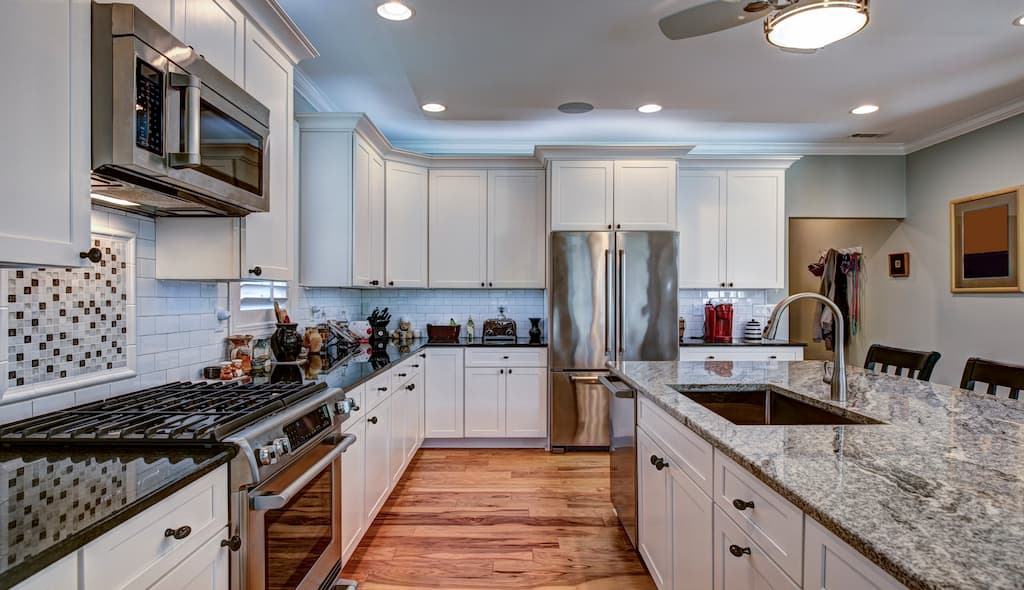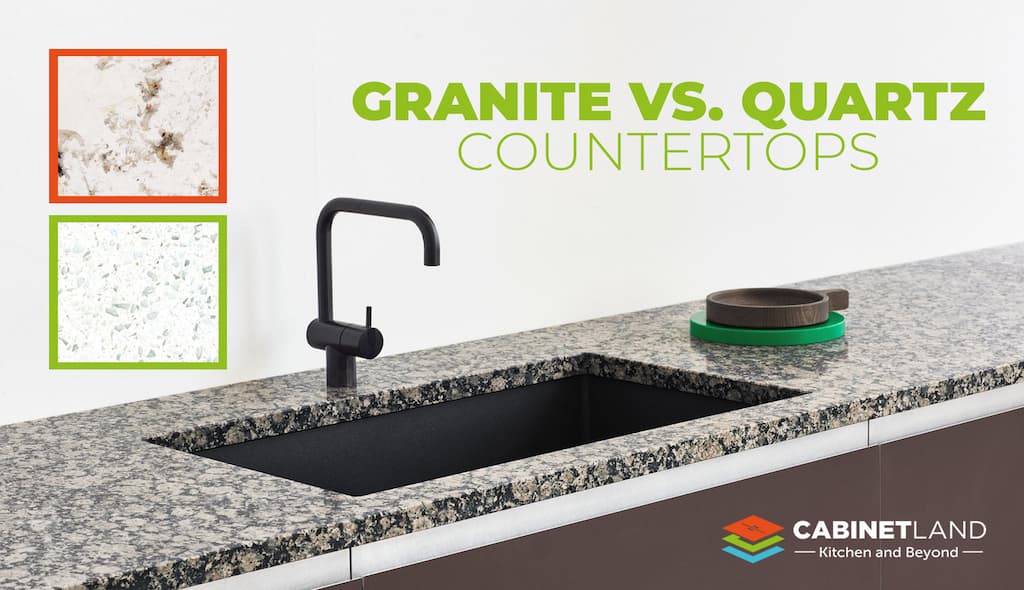Table of Contents
ToggleGranite vs quartz countertops is an important decision when choosing the right material for the countertops while renovating a kitchen or bathroom. Homeowners often weigh the pros and cons of these 2 types of material. Our detailed exploration from an expert perspective will delve into the intricacies of both materials, helping you make an informed decision based on durability, maintenance, cost, design, and overall value.
What Are the Key Considerations When Comparing Granite vs Quartz Countertops?
One of the most crucial decisions involves choosing the right countertop material. Granite and quartz are popular and esteemed choices in premium countertops. Each offers unique attributes in composition, durability, heat resistance, aesthetic appeal, and cost, making the selection process both intriguing and complex. Choosing between granite and quartz countertops often hinges on lifestyle considerations, design versatility, and personal preferences. This exploration delves into the key aspects that differentiate these materials, helping homeowners make an informed decision that aligns with their functional needs, design aspirations, and lifestyle dynamics.
1. Composition and Nature:
Granite is an igneous rock formed over millions of years from slowly cooling magma. Approximately 80% of the Earth’s crust is composed of granite, making it a common and accessible natural stone. Quarried from the Earth, each slab of granite is one of a kind, with the type and color depending on its mineral composition.
Quartz countertops, often called ‘quartz stone,’ are engineered rather than naturally occurring slabs. Made from over 90% quartz particles bound together with resins and pigments, these slabs are the product of a patented manufacturing process known as Bretonstone. With over 50 licensed producers globally, including the US-based Cambria, quartz offers a uniform appearance with various design possibilities.
2. Durability
Durability is a top consideration for countertop materials. Granite’s intrinsic hardness is attributed to its quartz and feldspar content, which accounts for its impressive scratch resistance—rated 7-8 on the Mohs scale. However, the exact resistance can vary based on the precise composition of the individual slab.
Similarly, engineered quartz counters are lauded for their durability. Quartz is harder than granite, which makes it slightly more durable and less prone to chipping or cracking. Its resin binders make it non-porous and highly resistant to staining without sealing. Brands like Silestone and Cambria boast high quartz content, meaning these surfaces resist scratches and impacts.
3. Heat Resistance
Granite’s resilience to heat is outstanding; it can endure very high temperatures, a testament to its fiery origins. This quality makes granite an excellent choice for areas with high heat, such as around stoves or fireplaces, and for outdoor applications where the stone is subject to direct sunlight.
In contrast, quartz countertops exhibit a lower tolerance to heat due to the presence of resin binders. While natural quartz is heat resistant, the engineered stone can suffer damage from high temperatures, such as hot pans, or prolonged exposure to UV rays, which can cause discoloration.
4. Aesthetic Uniqueness: Granite vs Quartz Countertops
Granite’s aesthetic appeal is largely rooted in its individuality; no two slabs are identical. The stone’s natural variance introduces many patterns and colors, ensuring a unique finish for each surface. However, this can present challenges when matching slabs for larger installations, necessitating professional expertise.
Quartz countertops, by design, offer a more uniform appearance. Although attempts have been made to introduce variation, the manufacturing process lends itself to predictability in pattern and color. This can simplify installation and provide a consistent look, which is especially beneficial in minimalist or contemporary designs.
5. Longevity and Lifecycle: Maintenance Over Time
When investing in countertops, understanding the longevity and lifecycle of the materials is crucial. Granite, a natural stone, is known for its long-lasting qualities. If properly maintained, granite countertops can last a lifetime. They require sealing upon installation and periodic resealing every one to two years to maintain their non-porous surface. Daily cleaning is simple, needing only a soft cloth and a mild detergent. However, if granite chips or cracks, repairs can be complicated and might not be completely invisible.
Quartz, on the other hand, boasts a more forgiving maintenance routine. Its non-porous surface doesn’t require sealing and is resistant to staining, making it a low-maintenance option for busy kitchens. While it is durable, if damaged, quartz can be difficult to repair seamlessly due to its uniform pattern. With proper care, quartz countertops can last several decades, but it’s important to avoid placing hot items directly on the surface as they can damage the resin binders.
6. Cost
Cost is a crucial factor in the decision-making process. Quartz countertops typically command a higher price, reflecting a non-porous surface’s manufacturing processes and benefits. Prices can range from $60 to $120 per square foot installed, with variations depending on brand and design.
Granite Countertops offers a spectrum of price points, from $30 to $60 per square foot for common varieties, with more exotic granites fetching higher prices, sometimes surpassing the cost of quartz. The final cost will reflect the uniqueness and rarity of the selected granite type.
7. The Impact on Home Value: Do Granite or Quartz Countertops Offer a Better Return on Investment?
Regarding home value, both are considered premium materials, and the choice between the two may come down to personal preference or the specific style of the home. In a market where modern, low-maintenance features are in higher demand, quartz might have an edge. Conversely, granite might be more beneficial in a market that values unique natural materials. The actual impact on home value also depends on the overall condition and location of the home, the local real estate market, and the quality of the installation.
8. What Lifestyle Factors Influence the Choice Between Granite and Quartz?
-
- Quartz’s durability and low maintenance might be more appealing if you enjoy cooking and frequently use your kitchen.
-
- Granite is the go-to choice for those who prefer a wholly natural product.
-
- How Do Granite and Quartz Countertops Compare in Eco-Friendliness?
-
- Granite requires quarrying, which has a higher environmental impact than quartz manufacturing.
-
- Quartz is not a fully natural product, but its durability and longer life might offset the environmental cost of production.
9. How Versatile Are Granite and Quartz Countertops in Design?
Quartz Countertops offer consistent patterns and come in a wide range of colors, including varieties that mimic the look of natural stone, concrete, and even marble. The consistent pattern is often preferred for a coordinated design scheme.
Granite countertops have long been a symbol of luxury in the home. They can appeal to potential buyers and contribute to a faster sale, though market trends and regional preferences can influence the exact ROI.

What are The Current Trends and Homeowner Preferences?
Recent trends in home design reveal a shift in homeowner preferences when it comes to countertop materials. Current statistics show an increasing lean towards quartz due to its design versatility and ease of maintenance. With the rise of contemporary and minimalist kitchen designs, the uniformity of quartz fits well with the aesthetic, pushing its popularity higher in new builds and remodels.
Granite, however, continues to hold a significant market share, favored for its natural beauty and uniqueness. It remains a top choice for homeowners seeking a classic or traditional look in their kitchen or bath. The National Association of Home Builders (NAHB) reports that granite is still highly valued by many home buyers, particularly in luxury homes with highly prized bespoke designs and natural materials.
Trends also point towards environmental considerations influencing decisions. Eco-conscious homeowners might opt for quartz as it is considered a more sustainable option due to lower quarrying impacts and durability. However, others might prefer granite due to its natural origins, considering the environmental cost of manufacturing quartz.
As of the latest surveys, the split between granite and quartz preferences is fairly even, with regional variations reflecting local style trends and availability. For instance, quartz might dominate urban markets where modern design is prevalent, while granite remains the mainstay in areas where traditional styling is preferred.
Making the Final Decision for Granite vs Quartz Countertops: Which One Should You Choose?
In conclusion, both granite and quartz countertops offer distinct advantages. Granite brings a unique, natural aesthetic to the table and can increase your home’s value. Quartz offers consistency in design, durability, and an arguably better long-term investment with its low maintenance needs. Ultimately, your choice will depend on your personal preferences, lifestyle, budget, and the overall design vision for your home.
Before making a final decision, consider getting samples of both materials to see how they fit into your space. Contact an expert and visit showrooms to get a real feel for the material. Remember that whichever material you choose, both granite and quartz can offer beauty and functionality to your home for years to come.




